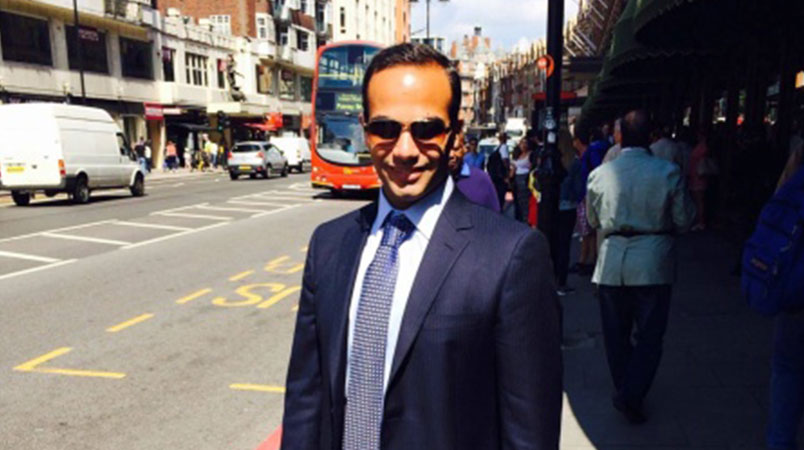Being under federal investigation hasn’t stopped former Trump campaign adviser George Papadopoulos from trying to advance his career.
Four months ago, shortly before he was arrested for lying to FBI agents about his contacts with Russian nationals during the campaign, he asked his followers on LinkedIn for their “thoughts” on him pursuing a congressional run. In October, around the time he pleaded guilty to those allegations, he expressed interest “in meeting with prominent publisher” and queried his LinkedIn connections for recommendations. And just a week ago, before his case was unsealed, Papadopoulos put out a call for “speaker bureau recommendations.”



This might seem like a remarkable degree of hubris for someone facing felony charges. But it represents a pattern for the 30-year-old Chicago native, who leveraged an inflated resume and the chaos of the crowded 2016 Republican primary into advisory roles on two major presidential campaigns.
On LinkedIn, a platform designed for self-promotion, Papadopoulos’ penchant for self-inflation stands out, dating back to his years at DePaul University, where he graduated in 2009 with a degree in political science.
Dick Farkas, Papadopoulos’ former professor and a Russia expert at the university, remembered him as a “nondescript” and not “particularly noteworthy” student who displayed no “particular interest” in Russian affairs.
Noting that Papadopoulos describes himself as concentrating on “international political economy,” Farkas told TPM that the school offers political science students no option for a concentration or specific regional focus and called it a “classic case of George embellishing his credentials.”
The listed phone number was disconnected at the Lincoln Square residence where the Chicago Tribune reported Papadopoulos currently lives with his mother and brother. A message left for his father, Antonios Papadopoulos, at his nephrology office in the suburb of Addison was not returned.
After receiving a masters degree from the University College London in 2010, Papadopoulos settled in Washington, D.C., where he claims on his LinkedIn to have spent some four and a half years as a “research associate” at the Hudson Institute, a conservative think tank. The institute told the Washington Post he was actually an unpaid intern who served as a contracted researcher to several fellows working on a book.
With just this thin resume and a few appearances at energy conferences abroad under his belt, Papadopoulos reached out to to Ben Carson’s campaign manager, Barry Bennett, through a LinkedIn message asking for a job, as Bennett recalled to the Post. Eager to beef up the campaign’s foreign policy team, Bennett told the Post he simply asked a friend at the Hudson Institute if Papadopoulos was an “okay guy” and brought him on board.
After a six-week stint with the Carson campaign, Papadopoulos was cut loose in January 2016 as part of what Bennett told the Post was an effort to reduce staffing costs.
How exactly Papadopoulos landed on Trump’s foreign policy team a few months later remains unclear. What’s known is that Sam Clovis, then the campaign co-chairman, was tasked with quickly pulling together a foreign policy advisory team, and that Papadopoulos’ name ended up on a list of five individuals that Trump announced were advising him on national security issues at a March 21 meeting with the Washington Post’s editorial board.
Court documents say that Clovis told Papadopoulos on March 6, shortly before he officially joined the campaign, that improved U.S.-Russia relations were a “principal foreign policy focus.” The young volunteer adviser seemed to take this advice and run with it, leveraging his new campaign title to communications with individuals he “understood to have substantial connections to Russian government officials,” according to his statement of offense.
One was Joseph Mifsud, a London-based professor of diplomacy, who Papadopoulos told senior Trump officials could connect the campaign with high-ranking officials in Russia’s Ministry of Foreign Affairs. Papadopoulos told the Trump team that another one of his connections was Vladimir Putin’s niece, though the FBI said the “Female Russian national” he met with actually had no relation to the Russian president.
Farkas, Papadopoulos’ former professor, told TPM he was skeptical his one-time student was actually making these kinds of high-level connections.
“I’ve traveled enough and I’ve studied enough about things Russian to know that he did not have the access he was claiming to,” he said.
In an interview this year, Papadopoulos told the Wall Street Journal he stayed on the campaign through the transition. His first interview with the FBI came on Jan. 27, just seven days after Trump was sworn in.
Though his recent LinkedIn queries suggest he’s continued to pursue a range of professional options while assisting the Mueller investigation, he currently appears to have no formal affiliation and is listed only as an independent “oil, gas and policy consultant.” In October, he tweeted a photograph of himself holding a briefcase on a London street with the hashtag #business.
The only current affiliation listed on his page is membership in the Cyprus-based International Presidential Business Advisory Council.
Contacted about this listing in August, the head of the organization, John Georgoulas, told TPM that “Papadopoulos is NOT a member of IPBAC, never was and we have never worked together.”
His claim to membership, Georgoulas added, was “weird and not true!”







Rising star.
@michaelryerson Rising star, indeed.
And what results? A few tattered scraps of charred paper and the lingering odor of brimstone.
A little power makes morons delusional.
Hashtag: business!!1!!!
(Edit - who knew that the hash/pound sign formats text big n bold … well, not me.)
Being a crook isn’t an impediment to hold office in the GOP, it’s a prerequisite.